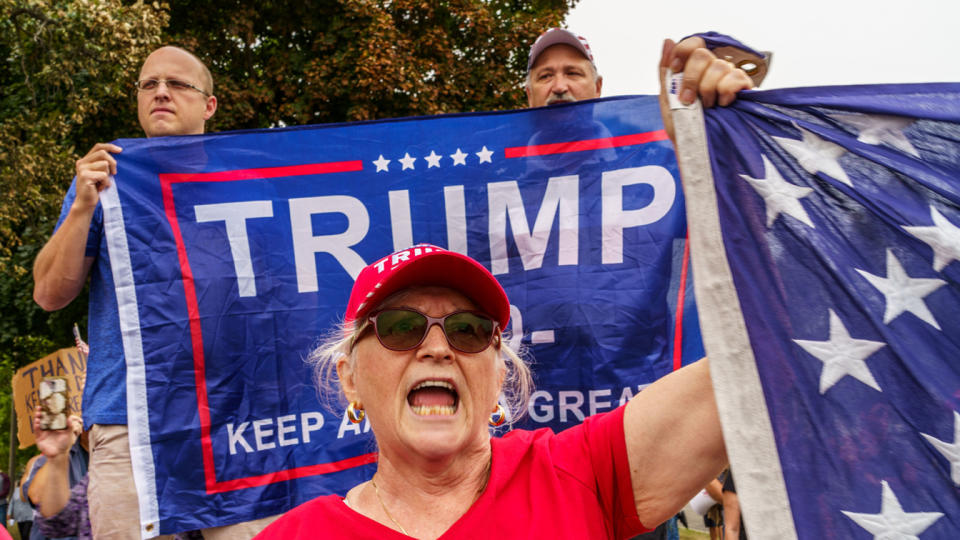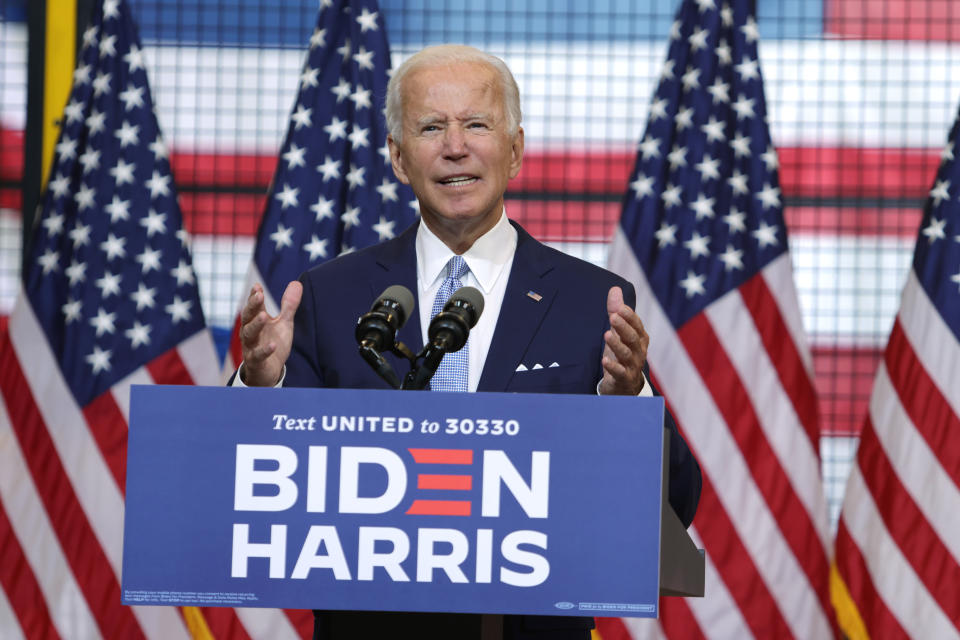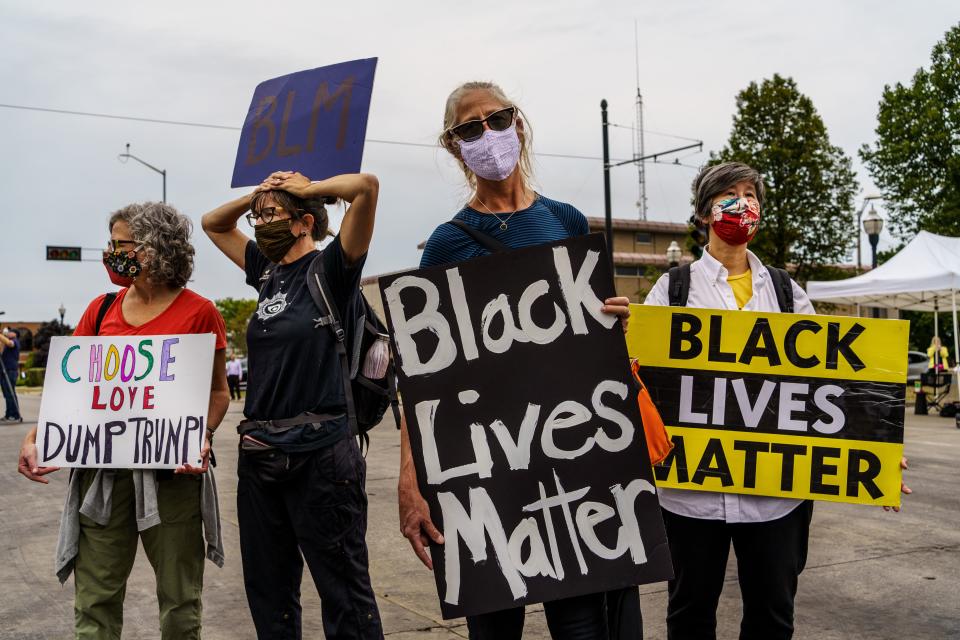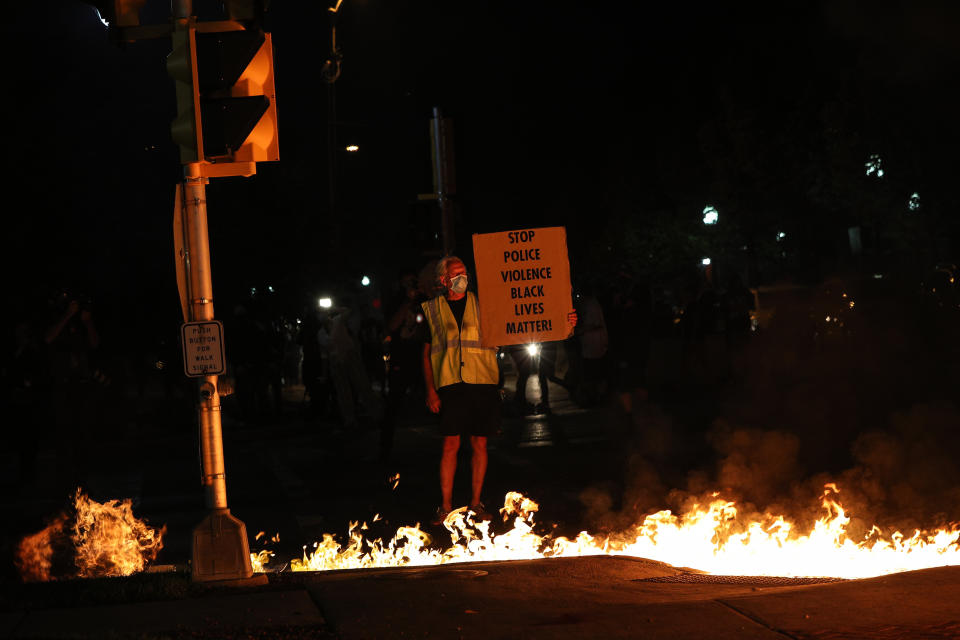New Yahoo News/YouGov poll: Will Kenosha backlash swing suburbanites to Trump? What the data says (so far)
In the wake of last week’s violence in Portland, Ore., and Kenosha, Wis. — and a Republican National Convention focused heavily on “law and order” — pundits have spent a lot of time pontificating about whether backlash to scenes of unrest in American cities will boost President Trump’s reelection bid.
Most of this chatter has been little more than speculation: hot takes with no basis in data. But a deeper look at the new Yahoo News/YouGov poll suggests that over the last month — a period that encompassed both parties’ conventions, the shooting of Jacob Blake by police, the killing of two Kenosha protesters by an armed Trump supporter and the killing of a right-wing counterprotester in Portland this weekend — concern about crime has climbed and patience with protesters has waned among the key bloc of swing voters Trump has been trying to target with talk of “agitators” and “anarchists”: suburban Americans.
At the same time, Trump’s numbers have improved in the suburbs — and Joe Biden’s have slipped.

For its latest Yahoo News survey, which was conducted Aug. 27-28, YouGov recontacted respondents who had participated in the Yahoo News/YouGov poll one month earlier to gauge how the RNC and other events affected their views.
As previously reported, the poll taken at the end of July showed Biden with a lead of a little less than 9 percentage points. In the new survey, those same registered voters gave Biden an edge of just over 6 points (47 percent to 41 percent) — his smallest margin in nearly two months.
Nationwide, Trump’s gains were modest: roughly 1 percent of registered voters switched from Biden to Trump, while a smaller number who previously said they would not vote changed their minds and said they would vote for the president.
This shift may represent a post-convention blip — the temporary product of four nights of flattering, pro-Trump spectacle. It may dissipate when the news cycle moves on. The Yahoo News/YouGov survey is just one poll. Its margin of error is about 4 percent.
Still, the trend lines among suburban Americans from late July to late August tell a fairly consistent story — and suggest at least some risk for Biden in the parts of the country poised to swing the 2020 election one way or the other.

For instance, between July and August, the same suburban Americans interviewed twice by Yahoo News and YouGov came to see Biden in a less favorable light. In the earlier poll, 46 percent of them said they had a favorable opinion of the former vice president; 49 percent said their opinion was unfavorable. One month later, Biden’s favorability among the same suburban Americans had fallen to 42 percent. His unfavorability had risen to 53 percent.
In other words, Biden’s suburban numbers are now nearly as bad as Trump’s, which did not change between July and August (42 percent favorable to 55 percent unfavorable).
What did change, however, were the head-to-head numbers between the two candidates. In late July, Biden led Trump by a decent margin in the suburbs: 48 percent to 41 percent. In late August, the same suburban Americans told Yahoo News and YouGov that they preferred Trump over Biden, 45 percent to 43 percent. That’s a 9-point swing.
Likewise, in July, 39 percent of these suburbanites predicted that Biden would win the election, compared with just 34 percent for Trump. In August they reversed course, with 46 percent picking Trump as the likely winner and only 41 percent choosing Biden.

It’s perilous to attribute this shift to any one cause — particularly when you’re talking about a sample size of just 386 respondents (the number of suburbanites who agreed to be interviewed twice).
But again, their changing responses to questions about race, crime and protests suggest a pattern. A few data points:
In July, the Black Lives Matter movement received a 46 percent favorable to 45 percent unfavorable rating from suburban Americans. Right after the Republican convention, that rating flipped: 44 percent favorable to 50 percent unfavorable.
In July, a majority of suburbanites said police brutality against minorities (53 percent) was a bigger problem than crime in their communities (47 percent). One month later, those same suburbanites were saying the opposite, with 53 percent now citing crime as the bigger problem.
Over the same period, the number of suburbanites who described recent demonstrations over police shootings of Black Americans as “mostly peaceful protests” fell 6 points, the number who described them as “equally peaceful protests and violent riots” fell 3 points, and the number who described them as “mostly violent riots” rose 6 points.
The events in Kenosha seem to have contributed to this change, with 44 percent of suburbanites characterizing them as “mostly violent riots” and only 16 percent calling them “mostly peaceful protests.” Asked which was the bigger problem in Kenosha — violence by protesters or violence toward protesters — 60 percent of suburbanites said the former, even though three protesters were shot and two were allegedly killed by Kyle Rittenhouse, an armed teenager from Illinois who took it upon himself to patrol the streets.
Perhaps as a result, suburban Americans are now evenly divided (42 percent yes to 42 percent no) over whether Trump should send federal agents to deal with protests in cities. In July, they said no by a 10-point margin (47 percent to 37 percent). By the same token, suburbanites say the “breakdown of law and order” (54 percent) is a bigger problem than “systemic racism” (46 percent).
Democrats shouldn’t panic (yet) over these suburban shifts. But they should pay attention.
In July, suburbanites narrowly favored Biden (41 percent) over Trump (39 percent) when asked who would do a better job handling crime; in August, they favored Trump (42 percent) over Biden (40 percent). Among suburban Americans, Biden still leads Trump by significant margins on the questions of who would do a better job handling race relations (48 percent Biden to 35 percent Trump) and the protests (45 percent Biden to 39 percent Trump) — but Biden’s margins have shrunk by 15 points on race and 11 points on protests since earlier this summer.

All in all, such patterns suggest a plausible explanation: that suburbanites inclined to be sympathetic to protesters are also inclined to lose patience, over time, with continuing violence, regardless of who causes it — and that the more persistent and chaotic that violence seems to become, the more forceful a response they may seek from politicians as a result.
That response, however, doesn’t have to mean physical force. In fact, suburbanites were asked in both July and August which approach would “help get things under control”: “law and order” or “bringing people together.” More said “bringing people together” in August (61 percent) than July (58 percent); fewer said “law and order.”
Majorities of suburbanites (52 percent) also think that Trump tries to divide, not unite, the American people, and that there will be more violence like Kenosha if he is reelected (53 percent), not less (27 percent). Two-thirds are either “not very worried” or “not worried at all” that violence will break out in their own communities. Most (54 percent) think the protesters want to “improve” America rather than “destroy” it — a number that hasn’t changed since July.
It’s possible, then, that suburban Americans have simply been waiting for more clarity and passion on this issue from a previously reluctant Biden — and that the speech he delivered Tuesday in Pittsburgh struck the right notes.
“Looting is not protesting,” he said. “Setting fires is not protesting. None of this is protesting. It’s lawlessness, plain and simple. And those who do it should be prosecuted. Violence will not bring change; it will only bring destruction.
“Fires are burning, and we have a president who fans the flames rather than fighting the flames,” Biden continued. “He can’t stop the violence because for years he’s fomented it. He may believe mouthing the words ‘law and order’ makes him strong. But his failure to call on his own supporters to stop acting as an armed militia in this country shows how weak he is. Does anyone believe there’ll be less violence in America if Donald Trump is reelected?”
It’s also possible — even likely, if past is precedent — that Trump overplays his hand. As the Atlantic’s David Graham pointed out, “Trump’s decision to stoke racial tension earlier this summer has been the one thing that has managed to shake up an otherwise very stable presidential race.” During the massive, nationwide protests that followed the deaths of George Floyd, Breonna Taylor and Rayshard Brooks at the hands of police, “Trump’s numbers tumbled, driven by voters — especially white voters — panning his handling of racial justice and the protests.” The same thing happened when Trump said there were “very fine people on both sides” in Charlottesville, Va.
Now, after a period of relative calm, Democrats argue that Trump is redoubling his efforts to aggravate racial tensions. On Tuesday he traveled to Kenosha over the objections of the Democratic governor and mayor, who warned that he will only make matters worse. He defended Kyle Rittenhouse. He denounced Black Lives Matter. He compared Blake’s shooting to missing a putt. He turned down a meeting with Blake’s family. He theorized, conspiratorially, that “people ... in the dark shadows” have been controlling Biden.
The idea, of course, is to stoke suburban fears by keeping violence front and center. But while the data shows that suburbanites want their leaders to respond, it does not suggest they will favor what Trump is likely to do next any more than they have in the past.
_____
Read more from Yahoo News:



